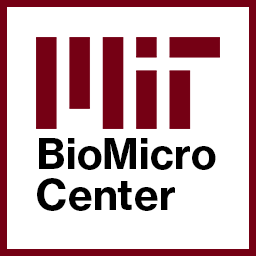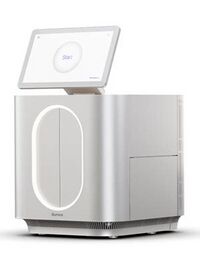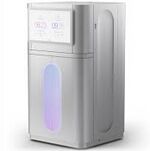BioMicroCenter:Illumina Sequencing: Difference between revisions
No edit summary |
|||
| Line 1: | Line 1: | ||
{{BioMicroCenter}} | {{BioMicroCenter}} | ||
The MIT BioMicro Center has a MiSeq i100 and supports | The MIT BioMicro Center has a MiSeq i100 and supports NovaSeqXplus sequencing from Illumina. We support a wide variety of applications, such as ChIP-Seq, miRNA sequencing and RNA-seq. | ||
== Illumina Massively Parallel Sequencing == | == Illumina Massively Parallel Sequencing == | ||
| Line 49: | Line 49: | ||
|} | |} | ||
| | | | ||
Illumina sequencing-by-synthesis is the primary workhorse of the BioMicro Center. These instruments produce millions to billions of reads simultaneously and are used in a very broad spectrum of applications. The Center currently supports a MiSeqi100 walkup sequencer and | Illumina sequencing-by-synthesis is the primary workhorse of the BioMicro Center. These instruments produce millions to billions of reads simultaneously and are used in a very broad spectrum of applications. The Center currently supports a MiSeqi100 walkup sequencer and NovaSeqXplus through collaboration with other local academic core facilities. <BR><BR> | ||
===Typical Workflow=== | ===Typical Workflow=== | ||
Illumina sequencing at the core begins with library quality control, during which the Center verifies the anchor elements and insert size using [[BioMicroCenter:RTPCR|qPCR]] and the [[BioMicroCenter:QC#AATI_FRAGMENT_ANALYZER|Fragment Analyzer]]. Users may elect to bypass this step if they provide the sample concentration and the concentration they would like to load at. Samples are then entered into the sequencing queue. Typical queues in the BioMicro Center are short, rarely exceeding 1-2 weeks, and samples are frequently run within a couple days. <B>We do guarantee a minimum number of reads per lane provided if: a) BMC performed the QC, b) the samples are high-complexity, especially in the first few nucleotides, and c) the samples are at least 2nM.</B> <br> | Illumina sequencing at the core begins with library quality control, during which the Center verifies the anchor elements and insert size using [[BioMicroCenter:RTPCR|qPCR]] and the [[BioMicroCenter:QC#AATI_FRAGMENT_ANALYZER|Fragment Analyzer]]. Users may elect to bypass this step if they provide the sample concentration and the concentration they would like to load at. Samples are then entered into the sequencing queue. Typical queues in the BioMicro Center are short, rarely exceeding 1-2 weeks, and samples are frequently run within a couple days. <B>We do guarantee a minimum number of reads per lane provided if: a) BMC performed the QC, b) the samples are high-complexity, especially in the first few nucleotides, and c) the samples are at least 2nM.</B> <br> | ||
Illumina sequencing through the BioMicro Center is only available in full lanes and not on a per read basis. You are welcome to collaborate with other laboratories in order to | Illumina sequencing through the BioMicro Center is only available in full lanes and not on a per read basis. You are welcome to collaborate with other laboratories in order to pool samples. However, please be sure to minimize any possibility of cross-contamination of indexes as well as [https://www.illumina.com/science/education/minimizing-index-hopping.html index crosstalk.] | ||
When ordering lanes, please be aware that only full flowcells will be sequenced. More lanes may be purchased to facilitate sequencing. The wait time for individual lanes can vary widely. Full flowcells have priority for sequencing.<BR><BR> | When ordering lanes, please be aware that only full flowcells will be sequenced ASAP. More lanes may be purchased to facilitate sequencing. The wait time for individual lanes can vary widely. Full flowcells have priority for sequencing.<BR><BR> | ||
===Data Handling=== | ===Data Handling=== | ||
Following sequencing, data is handled using a custom analytical pipeline. If an index was provided, samples are split by index and identified by DNA-ID. [https://en.wikipedia.org/wiki/FASTQ_format FASTQ] files and other desired formats will be placed in a delivery folder based on the project name, along with several quality control checks done for the sequencing data. We will provide an initial review of your project where we do try to identify any issues including incorrect indexes, sample contaminants, etc. Please note that our pipelines are built to find problems and are NOT designed to provide an initial analysis of your data. These analyses are built for speed, simplicity, and are not tuned in any way | Following sequencing, data is handled using a custom analytical pipeline. If libraries were made in the Center or an index was provided, samples are split by index and identified by DNA-ID. [https://en.wikipedia.org/wiki/FASTQ_format FASTQ] files and other desired formats will be placed in a delivery folder based on the project name, along with several quality control checks done for the sequencing data. We will provide an initial review of your project where we do try to identify any issues including incorrect indexes, sample contaminants, etc. Please note that our pipelines are built to find problems and are NOT designed to provide an initial analysis of your data. These analyses are built for speed, simplicity, and are not tuned in any way to your samples. We are always happy to discuss these results with you. Data will be available in your lab folder for 90 days post delivery, after which most of the data is deleted. FASTQ file will still be downloadable for two years but is delivered on a case by case basis.<BR><BR> | ||
===Custom Sequencing=== | ===Custom Sequencing=== | ||
Users may elect to prep their samples with custom oligos. If this is the case, custom sequencing oligos must be provided along with the samples at the time of submission. At least 15uL of each kind custom sequencing primer at 100 uM should be submitted per lane of most Illumina sequencers. At least 30uL of each kind of custom sequencing primer at 100uM should be provided per | Users may elect to prep their samples with custom oligos. If this is the case, custom sequencing oligos must be provided along with the samples at the time of submission. At least 15uL of each kind custom sequencing primer at 100 uM should be submitted per lane of most Illumina sequencers. At least 30uL of each kind of custom sequencing primer at 100uM should be provided per NovaSeqXplus flowcell. It is strongly recommended to contact biomicro@mit.edu before planning a custom library preparation. <BR><BR> | ||
| | | | ||
<BR><BR> | <BR><BR> | ||
| Line 149: | Line 149: | ||
''The Genome Analyzer IIs were donated to the BioMicro Center by Drs. Penny Chisholm, Chris Burge, Ernest Fraenkel and the Dept of Biology with contributions from many others '' | ''The Genome Analyzer IIs were donated to the BioMicro Center by Drs. Penny Chisholm, Chris Burge, Ernest Fraenkel and the Dept of Biology with contributions from many others '' | ||
!width=200| GAII/IIx: Boris, Natasha, etc 20-40m reads 1 to 8 lanes 24-72 nt/day max read length 80+80 in lane by lane | !width=200| GAII/IIx: Boris, Natasha, etc 20-40m reads 1 to 8 lanes 24-72 nt/day max read length 80+80 in lane by lane | ||
THE GA IS DEAD LONG LIVE THE GA Jack Daniels is | THE GA IS DEAD LONG LIVE THE GA Jack Daniels and Samuel Adams are DEAD LONG LIVE the HiSeq2000s Lucille and George are dead LONG LIVE NEXTSEQ 500s MiAmore is dead LONG LIVE THE MISEQ RUO PacBio is dead LONG LIVE THE SEQUEL II PromethION 24 is dead LONG LIVE THE P24 --> | ||
Revision as of 20:38, 21 October 2025
HOME -- SEQUENCING -- LIBRARY PREP -- HIGH-THROUGHPUT -- COMPUTING -- OTHER TECHNOLOGY
The MIT BioMicro Center has a MiSeq i100 and supports NovaSeqXplus sequencing from Illumina. We support a wide variety of applications, such as ChIP-Seq, miRNA sequencing and RNA-seq.
Illumina Massively Parallel Sequencing
|
Illumina sequencing-by-synthesis is the primary workhorse of the BioMicro Center. These instruments produce millions to billions of reads simultaneously and are used in a very broad spectrum of applications. The Center currently supports a MiSeqi100 walkup sequencer and NovaSeqXplus through collaboration with other local academic core facilities. Typical WorkflowIllumina sequencing at the core begins with library quality control, during which the Center verifies the anchor elements and insert size using qPCR and the Fragment Analyzer. Users may elect to bypass this step if they provide the sample concentration and the concentration they would like to load at. Samples are then entered into the sequencing queue. Typical queues in the BioMicro Center are short, rarely exceeding 1-2 weeks, and samples are frequently run within a couple days. We do guarantee a minimum number of reads per lane provided if: a) BMC performed the QC, b) the samples are high-complexity, especially in the first few nucleotides, and c) the samples are at least 2nM. Illumina sequencing through the BioMicro Center is only available in full lanes and not on a per read basis. You are welcome to collaborate with other laboratories in order to pool samples. However, please be sure to minimize any possibility of cross-contamination of indexes as well as index crosstalk. When ordering lanes, please be aware that only full flowcells will be sequenced ASAP. More lanes may be purchased to facilitate sequencing. The wait time for individual lanes can vary widely. Full flowcells have priority for sequencing. Data HandlingFollowing sequencing, data is handled using a custom analytical pipeline. If libraries were made in the Center or an index was provided, samples are split by index and identified by DNA-ID. FASTQ files and other desired formats will be placed in a delivery folder based on the project name, along with several quality control checks done for the sequencing data. We will provide an initial review of your project where we do try to identify any issues including incorrect indexes, sample contaminants, etc. Please note that our pipelines are built to find problems and are NOT designed to provide an initial analysis of your data. These analyses are built for speed, simplicity, and are not tuned in any way to your samples. We are always happy to discuss these results with you. Data will be available in your lab folder for 90 days post delivery, after which most of the data is deleted. FASTQ file will still be downloadable for two years but is delivered on a case by case basis. Custom SequencingUsers may elect to prep their samples with custom oligos. If this is the case, custom sequencing oligos must be provided along with the samples at the time of submission. At least 15uL of each kind custom sequencing primer at 100 uM should be submitted per lane of most Illumina sequencers. At least 30uL of each kind of custom sequencing primer at 100uM should be provided per NovaSeqXplus flowcell. It is strongly recommended to contact biomicro@mit.edu before planning a custom library preparation. |
|
Illumina Platforms



